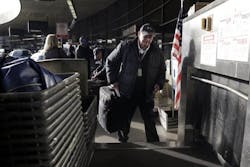Raising Ramp Pay Is Not Just About Helping Workers
I applaud the recent actions of the New York Port Authority (note: I said New York) to demand that airlines raise the wages of their contract workers at JFK and LGA making less than $9 an hour by $1 with an eventual pay raise to $10.10 an hour by 2015.
So far, two major airlines – Delta and American – have agreed. For reasons that are unclear to me, the New Jersey half of the bi-state agency is not demanding pay raises at its three airports in New Jersey, but that’s not relevant here.
Regardless of why the Port Authority is demanding pay raises for some of its airport workers, most of the commentary has focused on the workers themselves and the difficulty of trying to scrape by on such low wages.
Of course, I believe workers should be paid living wages. But there is another argument for increasing worker pay – and that is that it improves the safety and efficiency of ramp operations.
Of particular concern to me is the high turnover rate on the ramp from workers constantly leaving jobs for another job that offers even a bit more money or benefits, often off the airport. With so much turnover, many workers lack the job experience that can only come from years on the job. And lack of experience can lead to an increase in errors, with sometimes expensive consequences in either aircraft damage or worker injury.
In addition to high turnover rates, low wages also mean that workers frequently take on two or more additional jobs working 70 and 80 hours a week or take on a lot of overtime to make up for the low pay. These additional hours leave many workers fatigued with the increased likelihood of fatigue-related errors.
Even small errors can have costly impacts. I recently spoke with an airline executive about a “minor” rule violation at one of the New York airports. That “minor” incident caused aircraft damage of more than $6 million.
About the Author

John Goglia
John Goglia has 40+ years experience in the aviation industry. He was the first NTSB member to hold an FAA aircraft mechanic's certificate. He can be reached at [email protected].
John Goglia is an independent aviation safety consultant and Adjunct Professor at Vaughn College of Aeronautics and Technology and regular monthly columnist for four aviation trade publications. He was an airline mechanic for more than 30 years. He has co-authored two text books (Safety Management Systems in Aviation, Ashgate Publishing 2009 and Implementation of Safety Management Systems in Aviation, Ashgate Publishing 2011).
